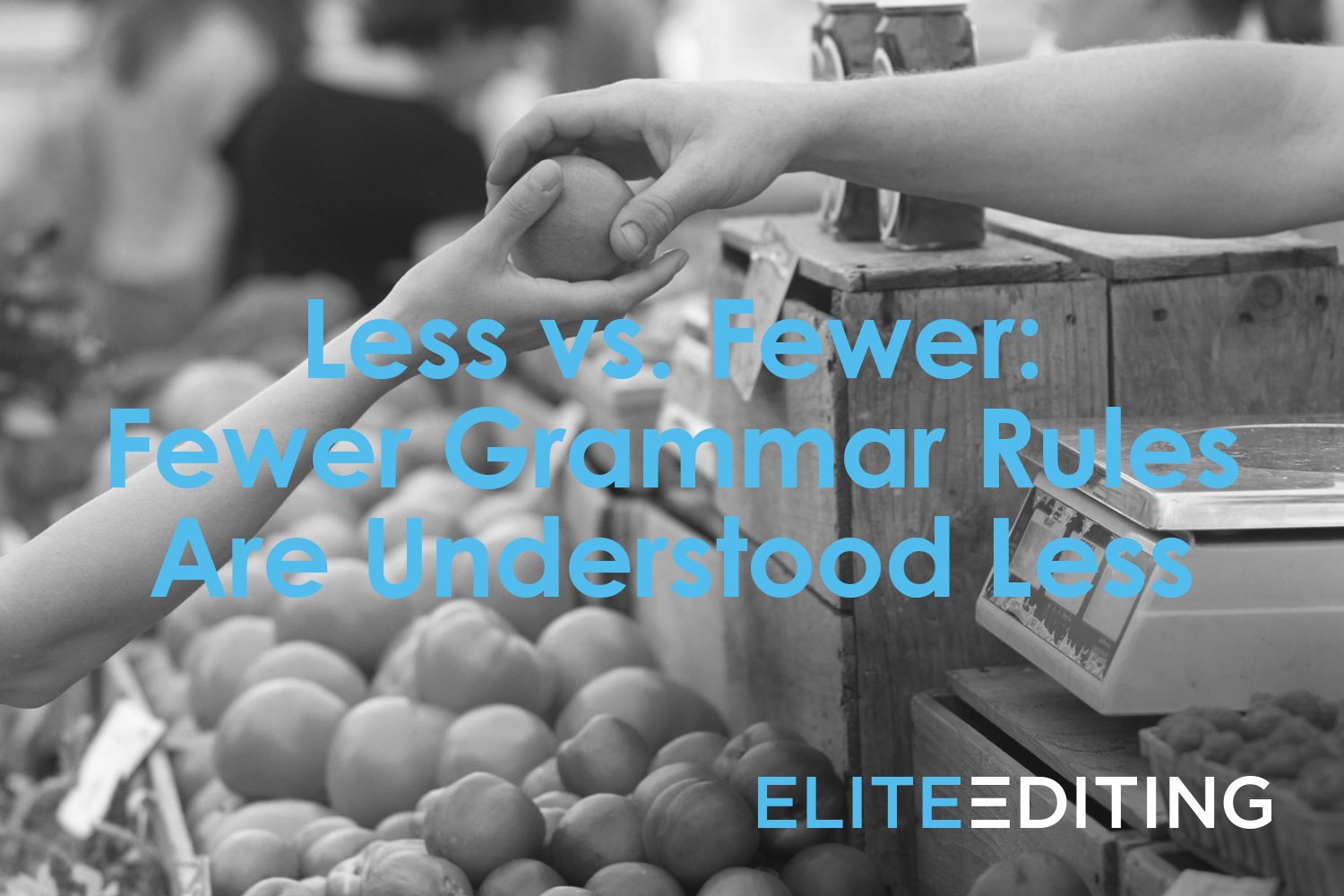
You’re self-checking groceries in the supermarket express lane when, without warning, the English teacher behind you in line yells “Fewer!” You check your cart and see that you’re two items over the limit—and you hang your head in shame. But then you realize that her anger isn’t directed at you when she hurls a potato at the sign that reads “12 Items or Less.”
And that’s why you’re here. You thought for sure you understood the difference between less vs. fewer. Unlike a supermarket CEO, you can’t make a living without using proper grammar, right? Don’t feel bad. There are good reasons you and most people struggle with these two words.
Less or fewer?
Less is an adjective than means a more limited number or amount. Fewer is a plural pronoun that means a smaller number of persons or things. So they mean pretty much the same thing. On top of that, more, an adjective meaning greater or further, is the antonym to both words—and has been since the early Middle Ages, when all three words came into being. (You could say that less shares more with fewer.)
In fact, there seems to be minor dissension over whether the words should be treated differently at all, because their distinction is based on nothing more than the personal preference of one eighteenth-century scholar. In Reflections on the English Language (1770), linguist Robert Baker proclaimed, “This Word is most commonly used in speaking of a Number; where I should think Fewer would do better. ‘No Fewer than a Hundred’ appears to me, not only more elegant than ‘No less than a Hundred,’ but more strictly proper.”
Baker was a trendsetter with a lot of clout at the time, so people started using fewer and less the way he wanted them to, and a rule of grammar was born.
The less vs. fewer rule: When it counts and when it doesn’t
Merriam-Webster advises that no rule for less vs. fewer is comprehensive, but this one we’re about to show you works most of the time. In proper usage, fewer is only used with countable things while less is used for singular mass nouns. (A singular mass noun is a person, place, or thing that cannot be counted.) If you can count it, go with fewer.
Countable things include puppies, diamonds, leaves, and bicycles. Singular mass nouns include love, dishonesty, foolishness, and humor. Can you count puppies? You certainly can. Therefore, you say fewer puppies, not less puppies. Can you count foolishness? You can certainly count on it, but you can’t count it, so it’s less foolishness, not fewer foolishness.
A sentence using both might make it clearer:
- The fewer chances the Olympic skater had to perform a triple axel, the less hope she had to win the gold.
Irregular plurals: Fewer and less when you don’t add an s
Fewer is also used when referring to irregular plural nouns—nouns that don’t end in s (such as mice, children, oxen, or men). For example:
- There are fewer mice than men in Steinbeck novels.
- Fewer children stole candy canes from Christmas trees this year.
Less is also used for something that doesn’t have a plural, like snow, pasta, gravel, fog, or hay. For example:
- There is less fog than pasta in London these days.
- If only the roads were covered with more hay and less gravel.
Less is more…complicated.
Less is also used with numbers and expressions of measurement or time, but this is an exception to the “Can you count it?” test (e.g., fewer distances, fewer times). The singular vs. plural test works best in these situations because the singular form cannot be counted. Basically, if a word showing measurement or time is singular, use fewer. If it’s plural, use less.
- There were fewer spaces in the parking garage on rainy days.
- There was less space in the closet for Irma to hang her raincoat.
Another tricky situation with less isn’t covered by any rule. Some words that shouldn’t have a plural are sometimes made plural: The Snows of Kilimanjaro, tropical waters, a grunge rocker’s flannels. In these cases, most grammar guides recommend rewording to avoid less or fewer.
In sum, the countable rule and the plural vs. singular rule work in most situations. But while the majority of grammarians would sympathize with the potato thrower in the grocery store, they would also caution writers not to rely on a hard-and-fast rule. The best bet is to trust your own ear for different contexts. You already know a person can’t have fewer judgment than you!
Resources:
https://anglophonism.wordpress.com/2013/08/05/less-or-fewer/
https://en.oxforddictionaries.com/usage/less-or-fewer/
https://www.merriam-webster.com/words-at-play/fewer-vs-less/







